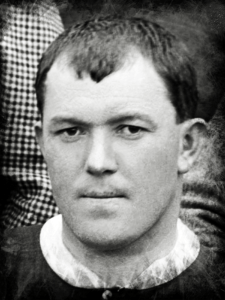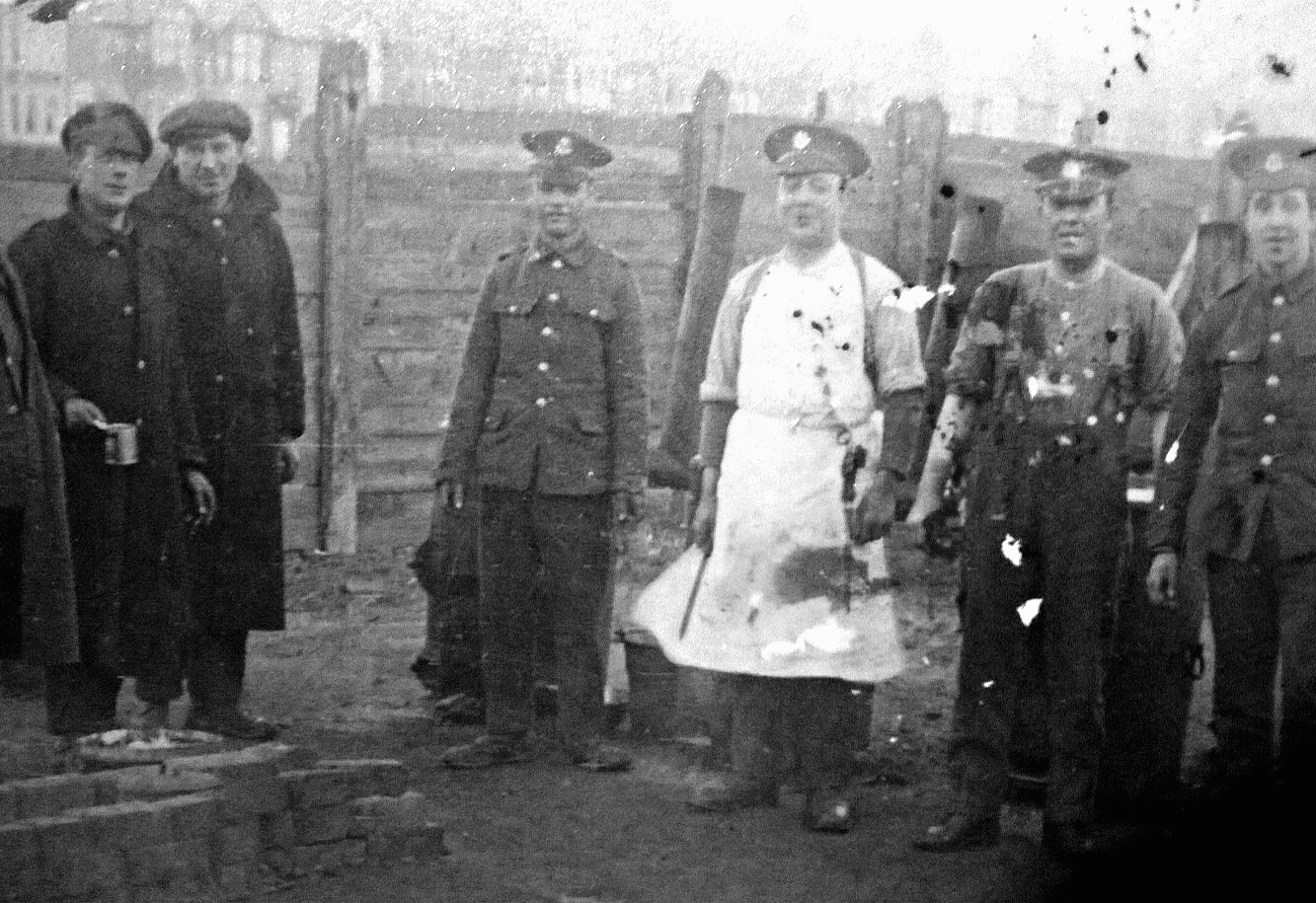 Alexander “Sandy” Turnbull (1884-1917) was born in Hurlford, Scotland on 30 July 1884 and died in France on 3 May 1917. Signed by Manchester City in 1902, Turnbull later played for Manchester United and scored the first-ever goal at Old Trafford. After enlisting in the British Army during the First World War, Turnbull was killed in action during the Battle of Arras in 1917.
Alexander “Sandy” Turnbull (1884-1917) was born in Hurlford, Scotland on 30 July 1884 and died in France on 3 May 1917. Signed by Manchester City in 1902, Turnbull later played for Manchester United and scored the first-ever goal at Old Trafford. After enlisting in the British Army during the First World War, Turnbull was killed in action during the Battle of Arras in 1917.
Early Life
Turnbull was born in the Scottish mining village of Hurlford, East Ayrshire on 30 July 1884, the second child of pit worker James Turnbull of 1 Gibson Street and his wife, Jessie. One of eight children, Turnbull was the family’s oldest son and became its principal wage earner in August 1900 when his father was killed in an explosion at Kilmarnock’s Nursery Pit. Turnbull was to spend the next two years working for the Portland Coal Company, before he was signed by English Second Division club Manchester City after a string of impressive performances for local outfit, Hurlford Thistle.
Manchester City
Turnbull made his Manchester City debut on 15 November 1902, scoring the first goal in a 3-2 defeat against Bristol City at St John’s Lane. The young Scot would go on to score 12 times in 22 league appearances that season, helping City to the Second Division title and promotion at the first time of asking. Turnbull soon formed a potent partnership with Welsh star Billy Meredith, despite early suggestions that he was to be sent back to Scotland, and struck 21 goals during the 1903/04 campaign as City finished finished behind The Wednesday. In the FA Cup, Turnbull netted five times to guide City to the final, where they were to secure their first piece of major silverware after beating Bolton Wanderers 1-0 at London’s Crystal Palace.
City were among the title favourites for the 1904/05 season, with Turnbull now firmly established as the club’s main goalscoring threat. Another prolific season followed and City went into the final game, away against Aston Villa, hoping to beat Newcastle United to the title. Tom Maley’s side had to win in Birmingham and hope their rivals lost at Middlesbrough, however a 3-1 defeat eventually saw them finish third behind champions Newcastle and Everton, who claimed second.
Worse was to follow for City however, when it was alleged Billy Meredith had offered Aston Villa captain, Alec Leake, £10 to “throw” the game in City’s favour. The subsequent enquiry proved catastrophic for the club as Meredith, perceiving a lack of support from his employers, lifted the lid on routine financial malpractice that saw the Welsh international and his team mates handed illegal bonuses to circumvent the £4 maximum wage.
The fallout created one of the biggest scandals in the history of English football and City saw their entire team, including manager Maley, handed lengthy suspensions and banned from ever playing for the club again. It was the end of Sandy Turnbull’s time at Hyde Road and in December 1906, he was persuaded to sign for neighbours Manchester United by their highly-respected manager, Ernest Mangnall. Furthermore, Meredith, Herbert Burgess and Jimmy Bannister were also tempted across east Manchester to United’s home ground at Bank Street.
Turnbull at Manchester United
The four former Manchester City stars made their United debuts on 1 January 1907 in a 1-0 home win over Aston Villa. Turnbull, as he did at City, scored in his first game for his new club and subsequently went on to score five further goals for Mangnall’s side as they consolidated a solid eighth-placed finish.
The 1907/08 season was to prove the most prolific of Sandy Turnbull’s career, and one which would cement his place as one of the greatest players of his day. Scoring 25 goals in 30 games, Turnbull was the catalyst behind United’s emphatic league title triumph, the first in their history, and had by now, become a firm favourite among the supporters at Bank Street.
Despite the title winning heroics however, the 1908/09 campaign was to prove one of frustration as United won the FA Cup, thanks to a goal from Turnbull, but slumped to a disappointing 13th place in the league. For a number of United players, most notably Meredith, Charlie Roberts and Turnbull himself, the following 12 months were to also see them make headlines off the field as they took centre stage in the battle to save the fledgling players’ union, the AFPTU, from disintegration. Threatened with suspension if they did not relinquish their union membership, the United players resisted the Football Association to the very end and eventually held out to ensure the survival of the organisation that would later become the Professional Footballers’ Associaiton (PFA).
Soon after, United left Bank Street and moved to a new stadium at Old Trafford, where Turnbull scored the first ever goal in a 4-3 loss to Liverpool. Twelve months later, United were to clinch their second league title in four seasons as they finished one point ahead of Aston Villa. It was another impressive season for Turnbull as he struck 18 league goals, including 13 in the opening 17 games. For Manchester United however, the title success of 1910/11 would prove to be their last before the First World War. Furthermore, it also marked the end of Ernest Mangnall’s long association with the club. In 1912, he would leave Old Trafford to take over as boss of neighbours, Manchester City.
Turnbull was to play one more significant part in the early history of English football however. At the end of the 1914/15 season, he was one of seven players found guilty of taking part in an illegal betting ring involving a game between Manchester United and Liverpool at Old Trafford. The match, played on Good Friday, 2 April 1915, proved to be the last of Sandy Turnbull’s professional football career and he was handed a lifetime ban by the FA soon after.
First World War Service
F3001 Private Turnbull enlisted in the 23rd (Service) Battalion of the Middlesex Regiment, better known as the 2nd Football, at Wendover Recruitment Office in late 1915, and was soon drafted into the already-talented battalion football team. Despite having enlisted in the army however, Turnbull was to fall victim to the lifetime ban imposed some months earlier by the FA and he was barred from taking part in a number of games, including one against Birmingham City on Christmas Day, 1915.
In May 1916, the 23rd Middlesex set sail for France, where they concentrated between Hazebrouck and Bailleul to prepared for the upcoming summer offensive north of the Somme river. The battalion did not take part in the opening stages of the battle, however it was to provide a substantial draft of men, including Turnbull, who were transferred into the 8th Battalion of the East Surrey Regiment to replace heavy losses sustained by that unit on 1 July 1916.
By May 1917, Turnbull had been appointed lance sergeant and was preparing to take part in the British spring offensive east of Arras that had begun on 9 April. The 8th East Surreys were to assault the northern approaches to the village of Cherisy as part of a series of attacks to become known as the Third Battle of the Scarpe. Zero hour was set for 0345.
The attack itself initially provided some success, with the village reportedly falling into British hands during the first hours of the assault. There followed some bitter fighting, however, and Cherisy would soon be back under German control – where it remain until captured by the Canadians in August 1918.
It was during the confusion of this early morning fight that L/Sgt Turnbull would go missing. While it is unclear what happened to Turnbull, a letter was sent to his wife by a soldier in the soon after the battle, which was subsequently published by the Liverpool Echo on 14 May 1917, it read: “After Alec had been wounded he carried on and led his men for a mile, playing the game until the last we saw of him. We all loved him, as he was a father to us all and the most popular men in the regiment. All here send our deepest sympathy.”
There was some initial hope that Turnbull had been taken prisoner, with early reports suggesting he was in a German field hospital behind the lines. Hope soon faded, however, and it was later confirmed that the 32-year-old footballer was missing, presumed killed. He left a widow and five children. In August 1918, Captain Lonergan, who had been wounded and taken prisoner during the attack, wrote to Turnbull’s wife, Florence, in an effort to provide further details about the circumstances surrounding her husband’s death.
It was a great shock to me to hear that my best NCO was still missing. Of course, I knew there was no hope of him turning up after such a long period. He was one of the finest fellows I have ever met. A great sportsman and as keen a soldier as he was a footballer. He had been hit through the leg early on in the fight. When I saw him his leg was very much swollen, so I ordered him back to the dressing station. He pleaded so hard, however, to stay on until we had gained our objectives that I gave way. Sandy was in command of a platoon. The men would simply go anywhere with him. Well, the end of it was that, although we gained all our objectives, the division on the left did not. Consequently, the enemy got round our flanks and we had to get back the best we could. We came under very heavy machine-gun fire during the withdrawal. This was when I was hit. As I fell I saw your husband pass me a few yards away. I saw him get to the village we had taken that morning. There was some shelter here from the bullets so I heaved a sigh of relief when I saw him disappear among the houses. I knew he could get back to our lines with comparative safety from there. I never heard anything more of him. Those who were wounded all thought that Sandy had got back. It was a bitter disappointment to me to hear that he had not been heard of. The explanation I can give is that he must have been ‘sniped’ by a German who was lying low in one of the houses. It was a rotten bit of luck. I would have recommended him from Germany, but I had my doubts whether the German censor would allow it to come through . However, I put his case strongly when I wrote from Holland and I do hope that he will get the highest distinction possible. He certainly deserves it.
Sandy Turnbull has no known grave and is one of the 34,795 names commemorated on the Arras Memorial to the Missing, located in Faubourg d’Amiens British Military Cemetery. In 1922, The Official History of the 18th Division in the Great War revealed one final recount of Turnbull’s death at Cherisy.
There is the story of ‘Sandy’ Turnbull, the Scottish International professional footballer who played inside left for the Manchester United team when they became champions of the Football League. Turnbull had become a sergeant in the 8th East Surreys. He was a good soldier, earnest, extremely wide awake, and a man of good influence. He had gone through towards Cherisy with Captain Longeran and his company; he was wounded, but went on. Early in the advance he spotted some enemy machine guns and turned a Lewis gun on them. He got hit again when trying to rush an enemy gun; then a third bullet smashed his knee and brought him down. But he waved his companions forward, shouting instructions from the map he carried. He directed other men who came up, and refused to be taken back. Afterwards he was missed and it was hoped that he had been taken prisoner, with a chance of recovery of his wounds. But nothing has ever been heard of him. He was a gallant man, and met a soldier’s end with calm fearlessness.

COMPLETE CAREER STATISTICAL RECORD
| Season | Club | League Position | FA Cup | League Games | League Goals | FA Cup Games | FA Cup Goals | ||||||
| – | |||||||||||||
| 1902/03 | Manchester City | 1st (Second Division) | R1 | 22 | 12 | 1 | 1 | ||||||
| 1903/04 | Manchester City | 2nd (First Division) | W | 32 | 16 | 6 | 5 | ||||||
| 1904/05 | Manchester City | 3rd (First Division) | R2 | 30 | 19 | 2 | 1 | ||||||
| 1905/06 | Manchester City | 5th (First Division) | R1 | 26 | 6 | ||||||||
| 1906/07 | Manchester United | 8th (First Division) | R1 | 15 | 6 | ||||||||
| 1907/08 | Manchester United | 1st (First Division) | R4 | 30 | 25 | 4 | 2 | ||||||
| 1908/09 | Manchester United | 13th (First Division) | W | 19 | 5 | 6 | 4 | ||||||
| 1909/10 | Manchester United | 5th (First Division) | R1 | 26 | 13 | 1 | |||||||
| 1910/11 | Manchester United | 1st (First Division) | R3 | 35 | 18 | 3 | 1 | ||||||
| 1911/12 | Manchester United | 13th (First Division) | R4 | 30 | 7 | 6 | 3 | ||||||
| 1912/13 | Manchester United | 4th (First Division) | R3 | 35 | 10 | 4 | |||||||
| 1913/14 | Manchester United | 14th (First Division) | R1 | 17 | 4 | 1 | |||||||
| 1914/15 | Manchester United | 18th (First Division) | R1 | 13 | 2 | ||||||||
| Summary | |||||||||||||
| Manchester City | 110 | 53 | 9 | 7 | |||||||||
| Manchester United | 220 | 90 | 25 | 10 | |||||||||
| Totals | 330 | 143 | 34 | 17 | |||||||||
A full list of sources used to create this page can be found here.

